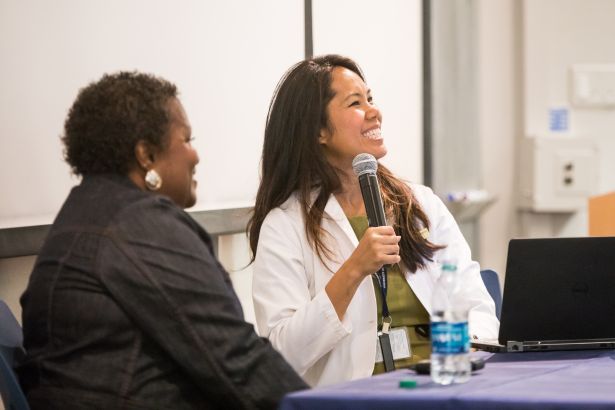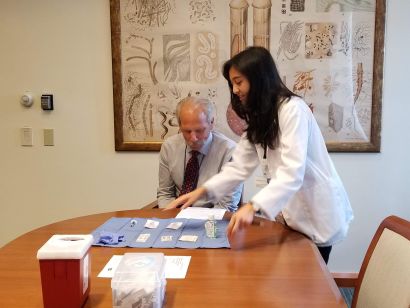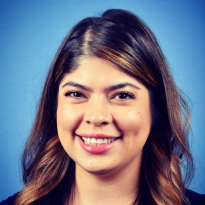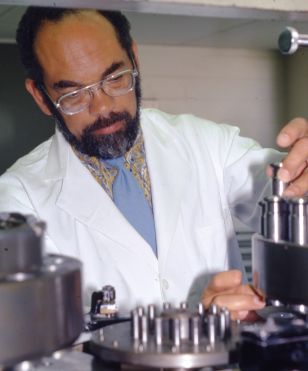- About
- Organization
- Organization Overview
- Dean’s Office
- Department of Bioengineering and Therapeutic Sciences
- Department of Clinical Pharmacy
- Department of Pharmaceutical Chemistry
- Quantitative Biosciences Institute
- Org Chart
- Research
- Education
- Patient Care
- People
- News
- Events
Update from the Dean – November 2018
By B. Joseph Guglielmo / Fri Nov 9, 2018
Dear UCSF School of Pharmacy Family and Friends:
The challenges associated with our health care system—and the demands on pharmacists—have never been greater. These include an aging population, critical needs of underserved communities, and a tidal wave of medical advances. However, we see these challenges as opportunities.
Pharmacists must make our health care system safer and more responsive to patient needs. I recently explained this point in an opinion piece discussing prevention of medication errors, which are a costly and deadly problem that could be addressed by expanding the role of pharmacists.
The best path forward for patients and for our health system lies with empowering pharmacists to practice at the top of their profession. Achieving this outcome will require new business approaches and new models of care—areas that the School will develop and pilot.
From our new curriculum to patient care outreach, and from medical device innovation to tackling cancer at the molecular level, I have much to share with you in this Update.
With warm regards,

B. Joseph Guglielmo, PharmD
Dean
Troy C. Daniels Distinguished Professor of Pharmaceutical Sciences
UCSF School of Pharmacy
Jump below to
Training the pharmacists of the future
The pharmacists that the School trains today must adapt to rapid change while maintaining a commitment to lifelong learning. As you will read, they are already on their way!
Curriculum transformation

The Class of 2021T, led by faculty member Jennifer Cocohoba, PharmD, met with a patient on the first day of instruction.
This past July, we welcomed 96 students into our new year-round, three-year competency-based doctor of pharmacy (PharmD) curriculum. The curriculum transformation has been an inspiring learning experience, not just for our students, but for our faculty and education staff as well.
I have described the curriculum in detail in previous Updates; to review, we’re guiding our learners to think scientifically as problem solvers, not just formula followers. Students build and knit together core knowledge and skills, experience pharmacy practice the very first day of pharmacy school, and explore innovations in science and practice.
This transformation has been no easy feat—it’s been a case study in collaboration and dedication to academic excellence, and I am extremely proud of these student pioneers. With their feedback and the considerable efforts of our faculty and education staff, our curriculum is a learning experience like no other.
Here are some highlights of our progress to date:
-
The Class of 2021T met with a patient on the first day of instruction, experiencing on day one what it means to be a patient-centered pharmacist.
-
Through our inquiry-based approach, students are learning to effectively ask and answer questions.
-
As in years past, the new class shares our values and our dedication to service, as exemplified by the Oath of a Pharmacist, which the class took in September.
An expanded role
Our students will graduate into a changing professional landscape with new opportunities, and we’re making sure they're ready. In the past few years, a number of states have enacted provider status for pharmacists, allowing them to independently provide services previously available only in physicians' offices and hospitals.
In a paper in the inaugural edition of the Journal of the American College of Clinical Pharmacy (October 2018), Dean Sean Sullivan from the University of Washington and I examined how California and Washington have implemented these changes and how the states are addressing hurdles, including reimbursement for care and availability of patient health information. The efforts of these two states offer promise regarding the role of the pharmacist in the safe, effective, and cost-effective use of drugs.
Gaining recognition

Vivian Chen
PharmD student Janelle Agustin, Class of 2021, prepares to give me my annual flu vaccination.
Our home city recently took note of the expansion of the pharmacist’s role in health care. In an event organized by our students, I joined a representative from the office of San Francisco Mayor London Breed and members of the School’s Flu Crew to recognize American Pharmacists Month. The Flu Crew is a student-run organization that provides free flu vaccinations. The goal of the event was to raise awareness regarding the full range of services pharmacists can now provide, from vaccination to hormonal birth control to medication counseling. I even received my own flu shot from one of our expert student pharmacists at the event.
Graduate match rate
As I mentioned in my previous Update, the rate at which our PharmD graduates matched for first-year residencies was an impressive 83% in 2018. These data rank UCSF among the top 2% in the country and are remarkably consistent with the past decade. I now have more data to share from our annual graduate placement survey.
|
Class of 2018 graduates in |
Percent |
|
Residencies |
63% |
|
Fellowships |
6% |
|
PhD programs |
1% |
|
Industry jobs |
4% |
|
Pharmacy jobs |
14% |
|
Considering next steps at the time of the survey |
10% |
|
Response rate for survey was 95% |
These data reinforce that UCSF PharmD graduates consistently pursue post-graduate training beyond the PharmD degree, highlighting one of the primary benefits of our three-year curriculum—a jumpstart on post-PharmD training opportunities.
School of Pharmacy scientists receive UCSF Medal
Fifty years ago, the field of drug discovery was at a crossroads. A growing recognition of the importance of proteins for cellular health mandated a new approach. At the time, pharmaceutical chemists lacked the tools to precisely design drugs that could ameliorate disease at the molecular level of proteins. In the subsequent decades, UCSF School of Pharmacy scientists invented the remarkable technologies that would usher in these now-standard approaches to drug discovery.

The 2018 UCSF Medal was awarded to three School of Pharmacy scientists (from left to right): Robert Langridge, PhD; Peter Andrew Kollman, PhD, in memoriam; and Irwin “Tack” Kuntz, PhD.
On November 8, UCSF bestowed the prestigious UCSF Medal on the three pioneering School of Pharmacy scientists who laid the groundwork for modern, computationally driven drug discovery. Peter Andrew Kollman, PhD (who was honored posthumously), Irwin “Tack” Kuntz, PhD, and Robert Langridge, PhD, brought computing and computational physics to drug discovery and to a principled understanding of biochemistry. Their pioneering innovations in molecular graphics (Langridge), docking (Kuntz), and atomistic simulations (Kollman) became the pillars of today's computational biology. Their work continues in the School’s Small Molecule Discovery Center and in our approach to solving challenges in drug discovery using virtual reality.
UCSF Medals were also awarded to health care activist Byllye Avery and longtime UCSF leader and health policy scholar A. Eugene Washington, MD, MSc.
Peter Andrew Kollman, PhD, Irwin “Tack” Kuntz, PhD, and Robert Langridge, PhD, were honored jointly with a UCSF Medal - the University’s highest honor - for their collaborative spirit, passion for discovery, and pioneering research in the field of pharmaceutical science. Kollman received the award posthumously. (UCSF)
Beyond drugs
Pharmacists are managing an increasingly wide range of therapeutics, including medical devices. Our scientists in the School are not only inventing these devices, they’re also working to optimize their use in patients.
A kidney, and now a pancreas

Shuvo Roy, PhD, is adapting this silicon filter for an artificial pancreas prototype.
In addition to his continuing progress on the bioartificial kidney, Shuvo Roy, PhD, a faculty member in the Department of Bioengineering and Therapeutic Sciences (BTS), is also working on another artificial organ. Adapting the same nanoporous membrane used in the artificial kidney, Shuvo is creating a prototype of an artificial pancreas. Tejal Desai, PhD, BTS department chair and faculty member, a key recruiter of collaborators for Shuvo’s project, is also working on an artificial pancreas of her own, among numerous other bioengineering advances.
Putting prosthetics to use
The best prosthetics take many years to reach FDA approval. Leslie Wilson, PhD, a health economist in the Department of Clinical Pharmacy, is working with the FDA to develop new standards to assess the value of a new generation of prosthetics—standards that will include a metric reflecting patient preference. Leslie’s work aims to connect patients with high-tech limb-replacement devices capable of fine motor control and even sensation.
Advancing the fight against cancer
School of Pharmacy scientists continue to make progress dissecting the molecular events that allow healthy cells to become cancerous, work that may lead to a new generation of effective, precise cancer treatments.
A new look at old drugs

Sourav Bandyopadhyay, PhD
Twenty years ago, PI3K inhibitors seemed like our best bet for fighting cancer; however, the drugs failed in clinical trials. Sourav Bandyopadhyay, PhD, a faculty member in the Department of Bioengineering and Therapeutic Sciences, discovered that breast cancer cells were using an alternative signaling pathway to grow in the presence of PI3K inhibitors. His lab demonstrated that a combination therapy aimed at both pathways halted the growth of the drug-resistant breast cancer cell lines, both in cell culture and animal models. Sourav and his team hope to test inhibition of these pathways in future clinical trials.
Mapping disease and health
To find new cancer treatments, we need a broad understanding of all of the molecular pathways that can potentially go haywire. Two collaborative projects based in the School are mapping cells and cell signals that are important both in health and in cancer. John “Scooter” Morris, PhD, and James Wells, PhD, both faculty members in the Department of Pharmaceutical Chemistry, are now contributing their talents to the Human Cell Atlas, a multi-institutional effort to define every cell type according to shape, function, and genetics. The atlas will enable scientists to study the root causes of this disease.
Similarly, the School’s Organized Research Unit (ORU) the Quantitative Biosciences Institute (QBI), with Nevan Krogan, PhD, at the helm, recently earned a $10 million grant from the National Cancer Institute to fuel the Cancer Cell Map Initiative, a collaborative effort to map the signaling pathways inside cancerous cells. Armed with a nuanced understanding of the cell types and signaling pathways that define every tissue in the human body, scientists will soon be taking the next steps toward developing better therapies.
Commendations for excellence
Our faculty, staff, and PhD and pharmacy students are committed to advancing the School’s mission of education, research, and patient care, and we are proud of the recognition they receive.
Leading the charge for a new curriculum
Vice Dean Sharon L. Youmans, PharmD ’85, MPH, was inducted into the UCSF Haile T. Debas Academy of Medical Educators. Sharon continues to serve as our leader as we transform our PharmD curriculum.
Mentoring the next generation of scientists
Kathy Giacomini, PhD, received the 2018 Bill Heller Mentor of the Year Award from the American Foundation for Pharmaceutical Education. Kathy is a faculty member in the Department of Bioengineering and Therapeutic Sciences, as well as the co-director of the UCSF-Stanford Center of Excellence in Regulatory Science and Innovation (CERSI).

Ian Seiple, PhD
Off to the races
Ian Seiple, PhD, earned two prestigious fellowships in 2018: the Beckman Young Investigator Award and the Packard Fellowship for Science and Engineering. Ian, a chemist specializing in the synthesis of next-generation antibiotics from simple chemical building blocks, is a faculty member in the UCSF Cardiovascular Research Institute and the School’s Department of Pharmaceutical Chemistry.
A lifetime of tackling disparities in asthma treatment
Asthma is more prevalent and more difficult to treat in children of African American and Puerto Rican descent, compared to children with other ancestry backgrounds; Esteban Burchard, MD, PhD, has dedicated his career to understanding why. A faculty member in the Department of Bioengineering and Therapeutic Sciences, Esteban recently received the Lifetime Achievement Award from the National Medical Association—the largest and oldest black physicians’ group in the U.S.—and he was also inducted into the San Francisco State University Hall of Fame.
A referee for precision medicine
It can take years for advances in medical technology to benefit patients. Kathryn Phillips, PhD, faculty member in the Department of Clinical Pharmacy and founding director of the Center for Translational and Policy Research on Personalized Medicine (TRANSPERS), studies why these advances stall—from development to regulatory approval, and from insurance coverage to physician utilization. Kathryn was recently appointed to the editorial board of JAMA Internal Medicine, where she is certain to make an impact on the approval and use of next-generation medical technologies.
Teamwork in health care
Leslie Floren, PharmD ’94, MA, was honored with a Research Paper Award at the International Association for Medical Education (AMEE) 2018 Annual Conference in Basel, Switzerland. Her winning presentation centered on the impact of teamwork on medical education. Leslie is a faculty member in the Department of Bioengineering and Therapeutic Sciences.

Todd Dubnicoff
Tejal Desai, PhD
Leadership in bioengineering
Tejal Desai, PhD, was appointed chair of the College of Fellows of the American Institute for Medical and Biological Engineering. Tejal serves here at UCSF as chair of the Department of Bioengineering and Therapeutic Sciences. In addition to her leadership in the field, her lab is developing novel drug delivery devices for the treatment of diseases ranging from glaucoma to diabetes.
Recognition for practitioners
-
Resident alum Michael Trillanes, PharmD, a neurocritical care pharmacist at UCSF Medical Center, received the California Society of Health-System Pharmacists (CSHP) New Practitioner Achievement Award, the Society’s highest honor for newly practicing pharmacists.
-
Alum Nicole Nguyen, PharmD ’12, led a UCSF program entitled “Slimming Down Medication Errors while Advancing Pharmacy Practice into the Bariatric Surgery Clinic.” This initiative was selected by the Committee on Healthcare Reform for the CSHP 2018 Innovative Pharmacy Practice Award.
Science trainee awards
-
Gauree Chendke received the 2018 UC Systemwide Bioengineering Symposium Award for Best Oral Presentation in Stem Cell and Regenerative Medicine. Gauree is the lab manager and a research associate in the Desai Lab, where she is working on various technologies for treating diabetes and HIV/AIDS.
-
Adam Rao was named the Grand Prize Winner and earned the People’s Choice Award in the UCSF Surgical Innovations Accelerator for Tabla, a low-cost, portable, acoustic device for detection of pneumonia. Adam is an MD/PhD candidate in the UCSF Medical Scientist Training Program, working in the Roy Lab.
Welcoming a new faculty member

Cynthia Valle-Oseguera, PharmD
Cynthia Valle-Oseguera, PharmD, joined the Department of Clinical Pharmacy as a faculty member and pharmacist practitioner with the Kaweah Delta Health Care District. Cynthia will work closely with Mitra Assemi, PharmD ’97, supporting our PharmD experiential education program in Fresno.

A young Robert D. Gibson, PharmD, in 1972
Robert D. Gibson, PharmD ’58, distinguished alumnus, educator, national leader, and a beloved member of our School family, died this past July, at the age of 93.
Bob had an illustrious career at UCSF, spanning five decades and numerous positions in pharmacy education, practice, and leadership. He served as president of both the American Pharmacists Association (APhA) and the American Association of Colleges of Pharmacy (AACP). His many awards included the prestigious APhA Remington Honor Medal.
Bob’s most lasting impact, however, stems from his lifelong efforts to bring diversity and equality to the pharmacy profession. His legacy has been carried forward by his countless mentees, many of whom have made their own noteworthy impact on the profession and the world.
Campus news
A little over a year ago, under the guidance of Chancellor Sam Hawgood, MBBS, UCSF launched a $5 billion campaign, representing one of the largest fundraising efforts ever undertaken by a U.S. university, with the goal of supporting students and faculty as they take on some of the most intractable health challenges.
Due to the exceptional generosity of donors to UCSF, the Campaign will allow UCSF to bolster its transformative research, education, and patient care, while building a foundation for the future. Take a look at this article that highlights the campaign.
Tags
Category:
Sites:
School of Pharmacy, Department of Pharmaceutical Chemistry, Department of Bioengineering and Therapeutic Sciences, Department of Clinical Pharmacy, PharmD Degree Program
About the School: The UCSF School of Pharmacy aims to solve the most pressing health care problems and strives to ensure that each patient receives the safest, most effective treatments. Our discoveries seed the development of novel therapies, and our researchers consistently lead the nation in NIH funding. The School’s doctor of pharmacy (PharmD) degree program, with its unique emphasis on scientific thinking, prepares students to be critical thinkers and leaders in their field.























